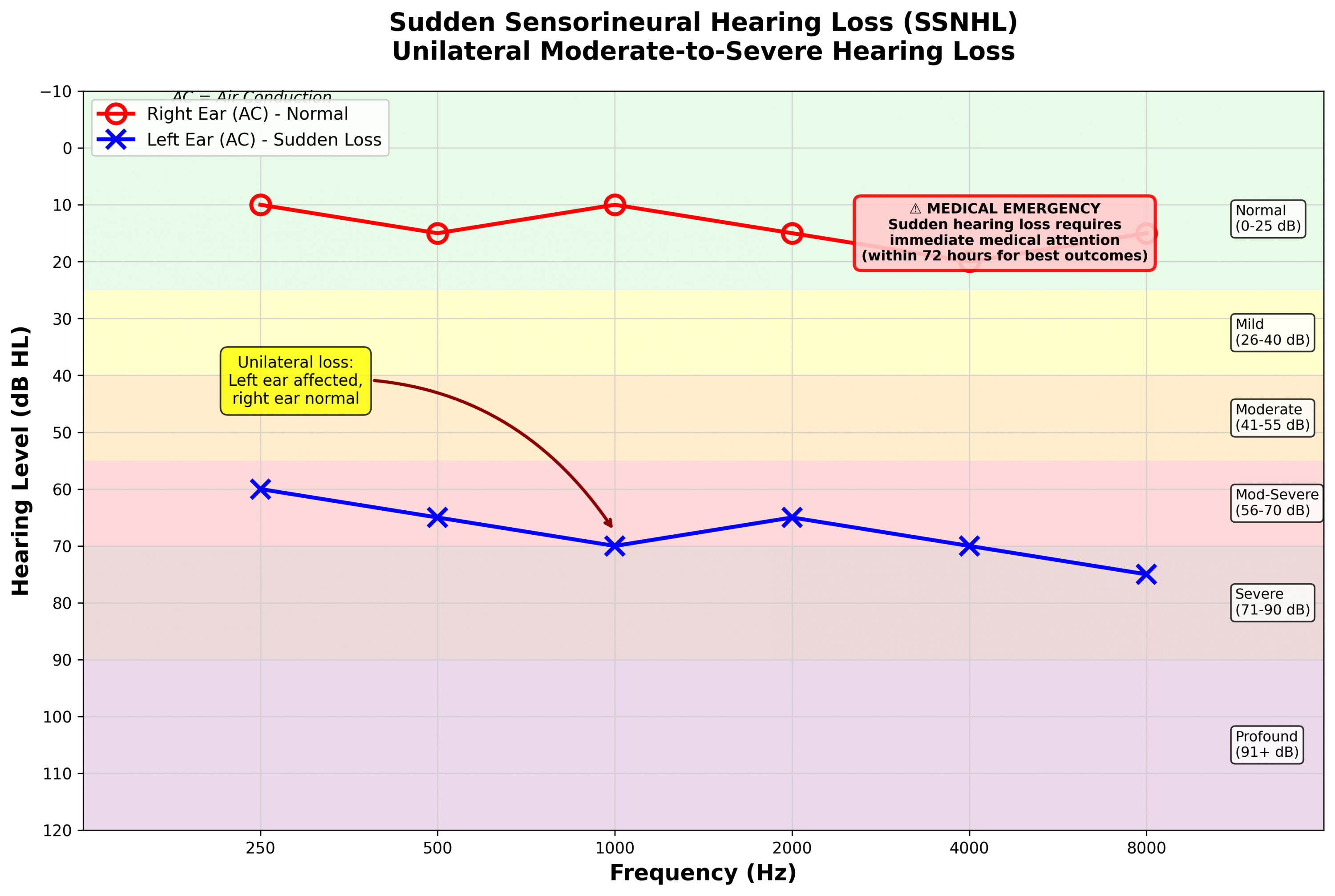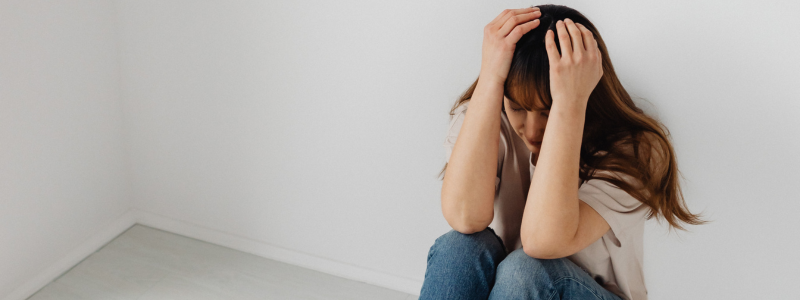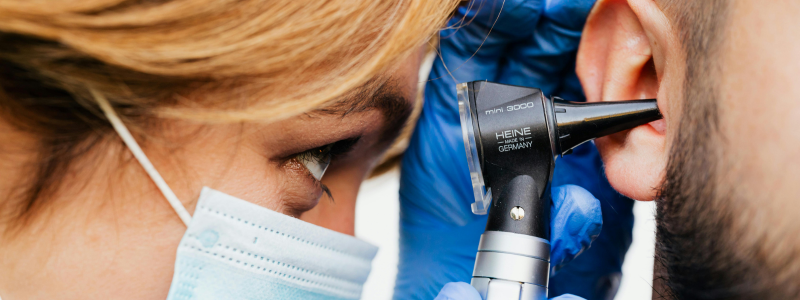
Head of Online Medical Content

Audiology Expert

What is Sudden Hearing Loss (SSHL)?
The causes, risks, symptoms and treatments
Overview | Causes | Diagnosing | Treatments | Prevention | Conclusion
Last Hearing Aid UK Update:
An instant decrease in hearing
Sudden hearing loss is an abrupt decrease in hearing, often occurring within a few days. Causes may include viral infections, vascular issues, or inner ear disorders. Symptoms can include hearing loss in one or both ears, tinnitus, or dizziness.
Visualise waking up one morning and realising you can’t hear out of one ear, or even worse, the world sounds muffled. You might be concerned, thinking it’s just a temporary blockage, but it’s important to seek medical help straight away.
Prompt medical evaluation is important for potential treatment with steroids or other interventions. In this article, we discuss the causes, risks, symptoms, and treatments available.
Getting help quickly matters - and we make it simple. If you're experiencing sudden hearing loss, our audiologists can see you at home or in the clinic, usually within days. There's no charge for the consultation, and if you're worried about someone else, you're welcome to attend with them.
Causes of sudden hearing loss
Sudden hearing loss is a serious and potentially debilitating condition that can occur without warning. It is defined as a hearing loss of at least 30 decibels in three or fewer days, usually affecting one ear.
For example, you might be at a family gathering, chatting with a few people, and then realise that one ear is barely picking up any sound. This could be a sign of SSHL.
What is the most common cause of sudden hearing loss? Sudden hearing loss can be caused by a variety of factors, including infection, inflammation, trauma and exposure to loud noise.
Because of this, it is important to seek medical attention immediately if you experience sudden hearing loss, as prompt treatment can improve outcomes and the success of the treatment.
Imagine enjoying a day at a festival, surrounded by music and conversation, and suddenly, your hearing in one ear goes – that’s a classic scenario where SSHL could occur, and you need to act fast.
Symptoms of sudden hearing loss can include a decrease in hearing in one ear, a feeling of fullness in the ear, tinnitus (ringing in the ear), and dizziness or vertigo.
You may also notice that when you're driving, the sounds on your radio are no longer as clear in one ear, or when watching TV, it’s harder to follow the dialogue.
The onset of symptoms can be sudden and may occur during everyday activities, such as listening to music or watching television. It could even happen during a peaceful evening at home, making it all the more alarming.
If you've noticed a sudden change in your hearing - even if you're hoping it's temporary - getting it checked quickly is important. The sooner sudden hearing loss is assessed, the better the possible results.
Other things that can cause sudden hearing loss include:
Infection: An ear infection can cause inflammation and swelling in the ear, leading to sudden hearing loss. For example, bacterial and viral infections can both cause sudden hearing loss.
Prompt treatment with antibiotics or antiviral medication may be essential to avoid additional damage. Imagine yourself waking up with a sore ear after a cold and realising that your hearing is affected.
Trauma: Trauma to the head or ear can cause sudden hearing loss. This can be caused by a blow to the head, a fall, or exposure to a loud noise. In some cases, trauma can cause damage to the tiny hair cells in the inner ear that are responsible for detecting sound waves.
A construction worker who’s been exposed to loud machinery or someone at a football match might be at higher risk.
Autoimmune disorders: Some autoimmune disorders, such as lupus or rheumatoid arthritis, can cause sudden hearing loss. These disorders can cause inflammation and damage to the blood vessels and nerves in the ear, leading to hearing loss.
Ototoxic medications: Some medications, such as certain antibiotics or chemotherapy drugs, can be ototoxic, meaning they can cause damage to the inner ear and lead to sudden hearing loss.
If you've recently undergone chemotherapy or been on strong antibiotics for an infection, you might notice changes in your hearing.
Meniere's disease: Meniere's disease is a disorder of the inner ear that can cause sudden episodes of vertigo, hearing loss, and tinnitus. The exact cause of Meniere's disease is unknown, but it is thought to be related to changes in the fluid pressure within the inner ear.
If you've suddenly experienced vertigo along with a reduction in hearing, Meniere’s disease may be the culprit.
Tumours: Tumours in the ear or near the auditory nerve can cause sudden hearing loss. These tumours can be benign or malignant, and prompt medical attention is necessary to determine the cause and appropriate treatment.
Idiopathic sudden sensorineural hearing loss: In some cases, the cause of sudden hearing loss is unknown, and it is classified as idiopathic.
It is thought that idiopathic sudden sensorineural hearing loss may be related to a viral infection, blood vessel problems, or immune system disorders.

Sudden Hearing Loss
Diagnosing this type of hearing loss
Diagnosing sudden hearing loss
Diagnosis of sudden hearing loss typically comprises a complete medical history, physical examination, and hearing tests. Your healthcare provider may also order imaging tests, such as an MRI or CT scan, to look for any abnormalities in the ear or auditory nerve.
If you’re unable to hear properly after an incident or wake up with muffled hearing, seeking an audiologist’s opinion is vital to determine the following actions.
What to expect at your appointment
During a hearing assessment, whether at home or in our clinic, your audiologist will:
- Take a detailed history of when the hearing loss started and any accompanying symptoms. Examine your ears to rule out simple causes like earwax accumulation.
- Conduct a comprehensive hearing test using professional equipment.
- Provide honest advice regarding the following actions, including whether you need an urgent medical referral.
- If appropriate, discuss hearing aid options and let you try different technologies.
- The appointment typically takes 45-60 minutes, and there's no obligation to purchase anything.
- If medical treatment is needed first, we'll tell you straight away.
Sudden hearing loss treatments
Treatment options for sudden hearing loss may include medication, such as steroids, to reduce inflammation and swelling in the ear.
Hyperbaric oxygen therapy, which involves breathing pure oxygen in a pressurised chamber, may also be used to improve blood circulation and decrease inflammation in the ear.
An individual who works in a noisy environment may receive steroids to reduce inflammation if a viral infection is suspected, or they may be offered hyperbaric therapy in a specialist clinic.
In most cases, hearing aids or cochlear implants may be recommended to improve and support your hearing health.
If you do need hearing aids following sudden hearing loss, we offer all major manufacturers without bias. You'll have 60 days to try them in your real-world environments - at work, in restaurants, during family gatherings - with a full money-back guarantee if they're not right for you. All aftercare, adjustments, and annual hearing tests are included for life, at no additional cost.
Many people find that having their hearing aids fitted and adjusted at home makes the process less stressful, particularly if they're still recovering from the initial shock of hearing loss. All our audiologists offer free home visits across the UK if that fits your needs, rather than clinic appointments.

Other treatments for sudden hearing loss can be:
Hyperbaric oxygen therapy: This involves breathing pure oxygen in a pressurised chamber, which can help improve blood flow to the inner ear and promote healing.
Hearing aids: If SSHL results in permanent hearing loss, hearing aids are highly recommended to help improve hearing.
Cochlear implants: In some cases, cochlear implants may be recommended for people with severe or profound hearing loss.
Vestibular rehabilitation therapy: This involves exercises and other therapies to help improve stability and lessen dizziness or vertigo associated with SSHL.
For instance, if you experience frequent bouts of dizziness, these rehabilitation exercises can help you regain balance and confidence in your day-to-day activities.
How can you prevent sudden hearing loss?
In addition to medical treatment, there are several things you can do at home to help manage sudden hearing loss:
Protecting your ears: Avoiding exposure to loud noises is key to preventing SSHL. This means wearing earplugs or other protective gear when in loud environments, such as concerts, sporting events, or when operating power tools or machinery.
If you’re a music lover who attends concerts regularly, investing in a quality pair of earplugs could save your hearing in the long run.
You should also limit the amount of time you spend listening to music or other loud sounds through headphones or earbuds and turn down the volume to a safe level.
For example, reducing your volume to no more than 60% when listening to music on bus or train services can help protect your hearing.
Managing existing health problems: Certain health conditions, such as high blood pressure, heart disease, and diabetes, can increase the risk of SSHL.
If you have these conditions, it is important to manage them effectively through lifestyle changes, medication, or other treatments. This can help reduce the risk of SSHL and other related health complications.
Adopting a balanced lifestyle: Adopting a healthy lifestyle can help reduce the risk of SSHL and other health conditions. This includes eating a healthy diet full of nutrients, staying physically active, getting enough sleep, and steering clear of smoking.
Avoiding ototoxic medications: Certain medications can cause hearing loss as a side effect, particularly if taken in high doses or over a prolonged period.
If you are taking medications that have the potential to damage your hearing, such as certain antibiotics or chemotherapy drugs, talk to your doctor about alternative treatments or ways to minimise the risk of hearing loss.
Monitoring your hearing: Regular hearing tests can help identify hearing loss early before it becomes more severe or permanent.
If you notice any changes in your hearing, such as difficulty understanding speech, ringing in the ears, or dampened hearing, see an audiologist or other hearing specialist right away.
Researching for a loved one?
If you're reading this because someone you care about has experienced sudden hearing loss, you're not alone. Many people come to us researching options for family members who are struggling, and it's one of the most thoughtful things you can do.
Sudden hearing loss can be frightening and isolating for the person experiencing it. The best next step is booking an assessment - you're welcome to attend with them. Our audiologists recognise that this could be a difficult time and will explain everything clearly to both of you.
Whether it leads to a referral for urgent medical treatment, a wait-and-see approach, or a hearing aid fitting, having professional input quickly can have a substantial effect on outcomes and peace of mind.
Conclusion
So, is sudden hearing loss an emergency? Sudden sensorineural hearing loss (SSHL) is a medical emergency that requires prompt diagnosis and treatment.
Though the specific cause of SSHL is often unknown, there are several lifestyle changes that can help reduce the risk of SSHL or prevent its recurrence.
Protecting your ears from loud noises, managing existing health issues, leading a healthy life, avoiding ototoxic medications, and monitoring your hearing regularly can all help reduce the risk of SSHL and promote good hearing health.
Whether you’re working with noisy machinery, enjoying a concert, or simply managing your health, protecting your hearing should be a top priority.
Why Choose Us?
- FREE Hearing Tests
- Best Hearing Aids and Prices
- FREE Aftercare for Life
- FREE Home Visits
- 200+ Local Audiologists
- 60 Day Money Back Guarantee
Think your hearing has changed?
Take action for your hearing health today
- Experiencing sudden hearing loss? Seek immediate medical attention
- Notice gradual changes? Book a hearing assessment
- Want to protect your hearing? Get personalised advice from our experts
- Don't let hearing loss go untreated. Contact us now for professional care and support.
Other hearing loss awareness articles you might like...
 Hearing aid stigma
Hearing aid stigma  How to tell if hearing loss is permanent or temporary
How to tell if hearing loss is permanent or temporary  Ways to keep your ears healthy
Ways to keep your ears healthy Our specialist service includes:
Do not spend hundreds of pounds without getting a second opinion from us.
Please call us on 0800 567 7621
 Not only are the prices great, but the service is fantastic! Many thanks to your team.
Not only are the prices great, but the service is fantastic! Many thanks to your team.What's included in our hearing aid prices?
Other pages you might find useful
Common FAQs about hearing aids and hearing loss
In general, any audiologist will always recommend to you the hearing aid model that best suits your needs. Here is a useful checklist to make sure that is the case.
- Audiologist's level of knowledge: The audiologist you have seen will hopefully have a wide knowledge of all available hearing aids; however, some will only be familiar with a small number of brands and, therefore, may not really be in a position to know which model is the best for you. It is OK to challenge their recommendation and ask them to justify why this particular brand is the one for you.
- Do research: Read about the hearing aid that was recommended. Does it seem like it will suit your lifestyle? Does it have more or fewer features than you need?
- Be aware of sales targets: Many high street retailers have specific tie-ins to a particular manufacturer/brand. The hearing aid they have suggested may still be the correct one for you, but do your research so that you know why they might have recommended it.
If you have significant hearing loss in both ears, you should be wearing two hearing aids. Here are the audiological reasons why:
Localisation: The brain decodes information from both ears and compares and contrasts them. By analysing the minuscule time delays as well as the difference in the loudness of each sound reaching the ears, the person is able to accurately locate a sound source.
Simply put, if you have better hearing on one side than the other, you can't accurately tell what direction sounds are coming from.
Less amplification is required: A phenomenon known as “binaural summation” means that the hearing aids can be set at a lower and more natural volume setting than if you wore only one hearing aid.
Head shadow effect: High frequencies, the part of your hearing that gives clarity and meaning to speech sounds, cannot bend around your head. Only low frequencies can. Therefore, if someone is talking on your unaided side, you are likely to hear that they are speaking, but be unable to tell what they have said.
Noise reduction: The brain has its own built-in noise reduction, which is only really effective when it is receiving information from both ears. If only one ear is aided, even with the best hearing aid in the world, it will be difficult for you to hear in background noise as your brain is trying to retain all of the sounds (including background noise) rather than filtering them out.
Sound quality: We are designed to hear in stereo. Only hearing from one side sounds a lot less natural to us.
Fancy some further reading on this topic? You can read about why two hearing aids are better than one in our article, hearing aids for Both Ears, here
For most people, the main benefit of a rechargeable hearing aid is simple convenience. We are used to plugging in our phones and other devices overnight for them to charge up. Here are some other pros and cons:
For anybody with poor dexterity or issues with their fingers, having a rechargeable aid makes a huge difference, as normal hearing aid batteries are quite small and some people find them fiddly to change.
One downside is that if you forget to charge your hearing aid, then it is a problem that can't be instantly fixed. For most, a 30-minute charge will get you at least two or three hours of hearing, but if you are the type of person who is likely to forget to plug them in regularly, then you're probably better off with standard batteries.
Rechargeable aids are also a little bit bigger and are only available in Behind-the-Ear models.
Finally, just like with a mobile phone, the amount of charge you get on day one is not going to be the same as you get a few years down the line. Be sure to ask what the policy is with the manufacturer's warranty when it comes to replacing the battery.
For most people, the answer is yes. But it's never that simple.
The majority of hearing problems affect the high frequencies a lot more than the low ones. Therefore, open fitting hearing aids sound a lot more natural and ones that block your ears up can make your own voice sound like you are talking with your head in a bucket. Therefore, in-ear aids tend to be less natural.
However, the true answer is we can't tell until we have had a look in your ears to assess the size of your ear canal, and until we have tested your hearing to see which frequencies are being affected.
People with wider ear canals tend to have more flexibility, also there are open fitting modular CIC hearing aids now that do not block your ears.
There is also the age-old rule to consider, that a hearing aid will not help you if it's sat in the drawer gathering dust. If the only hearing aid you would be happy wearing is one that people can't see, then that's what you should get.
Most people can adapt to any type of hearing aid, as long as they know what to expect. Have an honest conversation with your audiologist as to what your needs are.
Generally speaking, six or more. Unless it's none at all. The number of channels a hearing aid has is often a simplistic way an audiologist will use to explain why one hearing aid is better than another, but channels are complex, and it is really not that straightforward. Here are some reasons why:
Hearing aids amplify sounds of different frequencies by different amounts. Most people have lost more high frequencies than low, and therefore need more amplification in the high frequencies. The range of sounds you hear is split into frequency bands or channels, and the hearing aids are set to provide the right amount of hearing at each frequency level.
Less than six channels, and this cannot be done with much accuracy, so six is the magic number. However, a six-channel aid is typically very basic with few other features and is suitable only for hearing a single speaker in a quiet room. The number of channels is not what you should be looking at; it's more the rest of the technology that comes with them.
As a final note, different manufacturers have different approaches. One method is not necessarily better than any other. For example, some manufacturers have as many as 64 channels in their top aids. Most tend to have between 17 and 20. One manufacturer has no channels at all.
Manufacturer's warranties typically last between 2-5 years, depending on the brand and model, and cover defects in materials and workmanship. This includes repairs for component failures, electronic malfunctions, and manufacturing defects, but excludes damage from misuse, accidents, or normal wear. Most manufacturers also include loss and damage insurance for the first year.
We handle all warranty claims on your behalf, liaising with manufacturers and ensuring you get replacement devices quickly when needed. This comprehensive warranty coverage, combined with our lifetime aftercare, gives you complete peace of mind.
Our hearing tests are completely free, whether at our clinics or in your home. Unlike other providers who charge £30-£100 for home visits, we believe hearing healthcare should be accessible without financial barriers. Our comprehensive assessments include examination by a registered audiologist, audiogram results, and personalised recommendations.
All testing, future adjustments, and ongoing support are included at no extra cost. While NHS tests are also free, typical 6-week waiting periods often lead people to seek immediate private testing. We provide prompt, professional assessments that fit your schedule and budget.
Yes, we offer completely free home visits throughout the UK, and this service is included in our prices with no additional charges. Home visits are particularly valuable for people with mobility issues, busy schedules, or those who simply prefer the comfort and convenience of their own environment.
Our audiologists can conduct full hearing tests, fit hearing aids, and provide ongoing support in your home. This service sets us apart from many providers who either don't offer home visits or charge extra for them.
We can offer prices up to 40% lower than high street retailers because of our business model. As a network of 200+ independent audiologists, we don't have the massive overheads of large retail chains - no expensive high street premises, no sales targets pushing audiologists to sell the most expensive options, and no costly marketing campaigns.
However, we maintain the same buying power as the big chains because we purchase on behalf of our entire nationwide network. This means you get access to the same premium hearing aids with professional service, but at genuinely competitive prices.
We offer a comprehensive 60-day money-back guarantee, which gives you twice the industry standard time to properly assess whether your hearing aids are right for you. This extended period recognises that adjusting to hearing aids takes time, and your brain needs several weeks to adapt to the amplified sounds.
Unlike many providers who offer just 30 days, we believe 60 days gives you the confidence to test your hearing aids in all the situations that matter to you - from quiet conversations at home to busy restaurants and outdoor activities.
Ask the Experts
6 Morton Lane
Walkwood
Redditch
Worcestershire
B97 5QA
Latest Launch
When we refer to a product as 'Latest Launch', we mean it is the latest to be released on the market.
New
When we refer to a product as 'New', we mean that the product is the newest hearing aid model on the market.
When we refer to a product as 'Superseded', we mean that there is a newer range available which replaces and improves on this product.
Older Model
When we refer to a product as an 'Older Model', we mean that it is has been superseded by at least two more recent hearing aid ranges.
